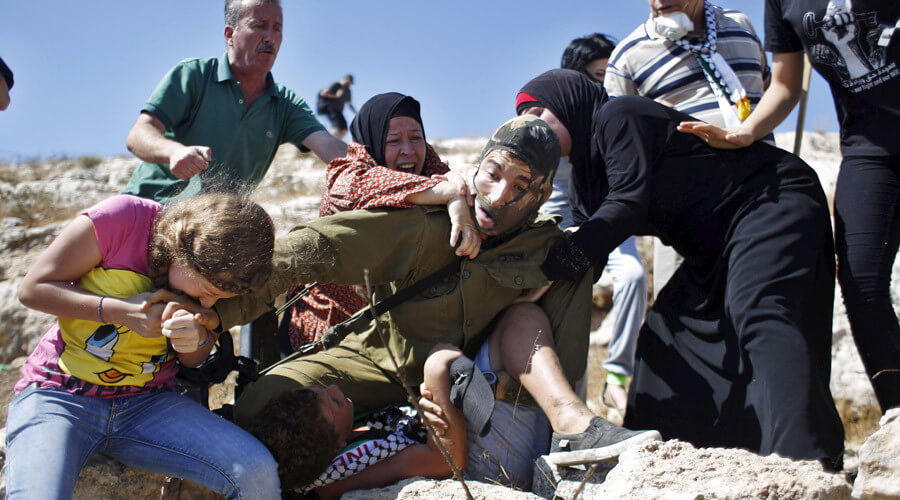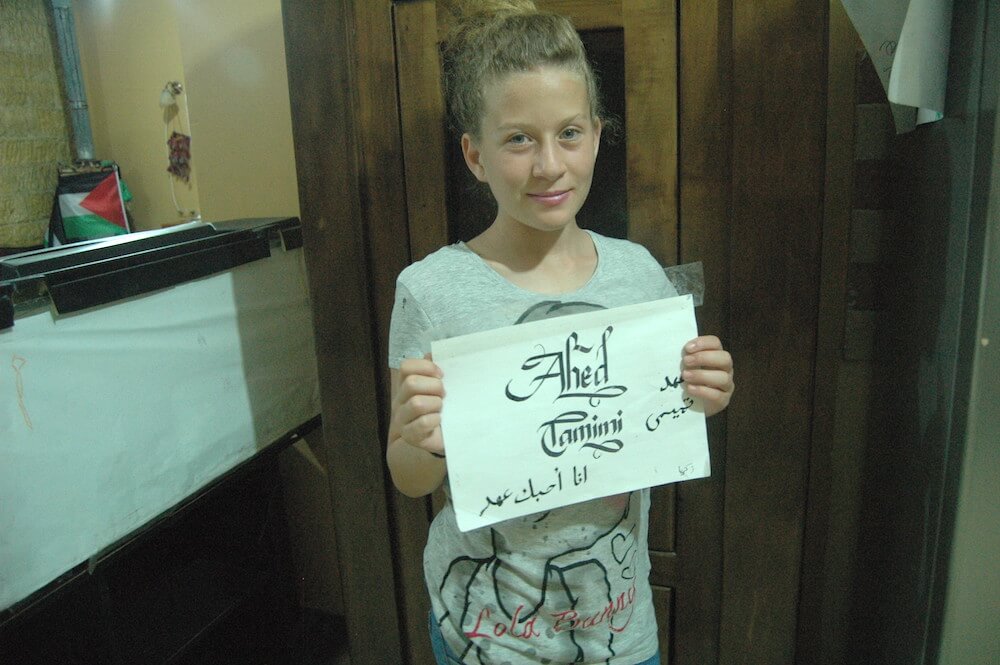
Palestinians rush an Israeli soldier detaining a boy during a demonstration in the West Bank village of Nabi Saleh, near Ramallah, August 28, 2015. (Photo: Mohamad Torokman/Reuters)
“The pictures went viral. That’s important,” Ahed Tamimi, 14, said, “so the world can see what happens.” Ahed is the blond teen on the far left of the widely-published photo of a violent confrontation between Palestinian women and children, and an Israeli soldier in the West Bank village of Nabi Saleh. In the frame Ahed is seen biting the soldier after he hits her in the face. Since the now infamous images were first published, the Tamimis, and Ahed in particular, have been visited by droves of journalists wanting to know how the Palestinian family felt when they saw 12-year old Mohammed Tamimi, also known as Abu Yazan, slammed to the ground.
In the photographs the Palestinian girls and women look panicked, and the Israeli soldier’s expression is frantic. Underneath him is young Abu Yazan who looks as though he is in excruciating pain, pulled and yanked by the soldier, his arm in a cast as it is pressed into a boulder. The four Tamimi women—Nariman and Nawal, middle-aged mothers, and the girls, Ahed and Nour, teenagers—had rushed the soldier who was attempting to detain Abu Yazan for stone throwing during a weekly protest against settlement land confiscations.
“When you see someone in your family in danger you don’t have time to think about it,” Nour Tamimi, 16, said as we sat on the patio of Ahed’s house. She is Ahed’s cousin and on the far-right wearing a black top in the viral images.
“He was beating me and I saw his hand on my face, so I bit him,” the soft-spoken Ahed added.

Nour Tamimi (L) and Ahed Tamimi (R). (Photo: Allison Deger)

Nour Tamimi (L) and Ahed Tamimi (R). (Photo: Allison Deger)

Ahed Tamimi. (Photo: Allison Deger)
Ahed and Nour appeared painfully shy while we talked, Ahed more than Nour. Both were dressed in jeans and a t-shirts, Ahed’s with a print of “Lola Bunny,” Bugs Bunny’s love interest. Ahed likes to play soccer and dance. She studies English in school, but is sheepish about using it. When she grows up, she wants to be a lawyer. The two fidgeted on a set of outdoor sofas, then moved into the kitchen to make an evening snack, sandwiches with lebane, a thick Middle Eastern yoghurt, and shata, a red spicy garnish. While preparing the meal, they giggled like young girls do. The night was cool and breezy, a welcome break from a heat wave that had recently covered the region. The laughter from the pair, and arrival of dozens of visitors from towns across the West Bank gave an almost festive mood to the night. It was a far cry from the tumult that had passed four days earlier.
Even so, downhill, the Israeli military was perched at a flying checkpoint, searching cars entering and exiting Nabi Saleh. Some residents were forbidden from leaving the village, including Ahed’s parents on Tuesday morning. The couple was detained for an hour and a half, before Israeli forces sent them back inside their town.
When the photos broke, international media captioned the soldiers’ use of force against a child with a broken arm as a ‘David and Goliath’ tale, while Israeli media was appalled that a group of females had put a soldier in danger. The women bit, scratched, slapped, and punched the soldier. Then they tore the balaclava off of his face. Adjacent although not pictured, and not included in a video that also captured the weekend scene, was Bassem Tamimi (husband of Nariman and father of Mohammed and Ahed) and his youngest son nine-year old Salam Tamimi who was also struck by soldiers.
In the aftermath Israel’s minister of culture and sports Miri Regev called for looser regulations on the use of live-fire for soldiers, decrying the “humiliation” the pictures brought to the Israeli army.
Yet for the Tamimi family the incident turned internet spectacle was just another Friday living under occupation, no more no less. It began with a demonstration and ended with five members of their family in the hospital. Nariman has asthma and uses crutches, after she was shot by Israeli soldiers months ago in her knee cap. She needed treatment from strikes to her injury. Bassem, Ahed, and Abu Yazan also suffered blows to their bodies. As for Salam, he was shot with a rubber bullet leaving his toe broken.
Uniformly the whole of the Tamimi family was surprised that so many from the foreign press had arrived to follow-up on the iconic pictures. What’s more, that the protest warranted attention from the Israeli government.
“They made such a big deal about this soldier’s ‘humiliation,’ but they are killing Palestinian people,” Nour said, making a reference to Regev’s statement. To the teens of Nabi Saleh, the Israeli army is already viewed as trigger-happy. In 2013 when journalist and author Ben Ehrenreich wrote a feature on Nabi Saleh for the New York Times Magazine, Nariman estimated 100 from the village have been arrested, and nearly 500 injured during demonstrations. In recent years, two of the town’s members—also part of the Tamimi clan—were killed by Israeli soldiers. Mustafa Tamimi, 27, was struck in the head at close range with a tear gas canister in 2011 and Rushdi Tamimi, 31, was killed with live fire the following year.
For young people in Nabi Salah, Mustafa and Rushdie’s death have had a lasting imprint and the hardships have made them grow up faster. “After six years we started to know how to deal,” said Nour, indicating the length of time Nabi Saleh’s resident have conducted weekly protests, which began in 2009 after settlers’ closed off access to the village’s natural spring.
“Three and a half years ago my friend died from Israeli soldiers, so I became stronger. So I said to myself ‘why don’t I be a journalist’ that sends the message of all children, to all people in the world,” Janna Jihad, 9, said, a cousin and close friend of Ahed. “Mustafa,” Jihad continued, “he was a friend to all of the children in Nabi Saleh.”
Jihad, a spunky and confident girl who was raised between Nabi Saleh and West Palm Beach, Florida then pronounced, “I’m the smallest journalist in the world!” She has a Facebook page with close to 20,000 followers who read her updates and view her pictures of Nabi Saleh’s protests. Her timeline is filled with images of her relatives and classmates running from tear gas typically fired at protesters during the weekly marches. When she grows up, Jihad said she wants to report for CNN or Fox, to have a platform to reach people about the ways children suffer from occupation. Mustafa’s killing, Nariman’s shooting, Salam’s shooting, the shooting of another relative three weeks before who was struck with five bullets in the stomach, had left Jihad with the impression that her village is in chaos “everyday, everyday, everyday. So it’s not a life.”
As we spoke Ahed re-joined the group of children that had gathered on a hillside overlooking the settlement of Halamish, built on Nabi Saleh’s land. The settlement was established by hardliners from Gush Emunim in the 1970s and since has flourished into a pristine suburb equipped with swimming pools, sidewalks and armed guards at the front gates. In Nabi Saleh, most of the roads are unpaved. The disparity in wealth is blisteringly apparent.
Back when Bassem, Ahed’s father, was young, he used to play on the slopes that is now covered in cookie cutter Halamish homes. The low valley was clothed in wheat fields and patch vegetable gardens.
“There’s a relationship between us and this land,” he said, between conversations with neighbors about a future one-state or two-state in Israel and the occupied Palestinian territory and how to broaden the non-violent struggle of weekly demonstrations. Bassem supports one-state, what he sees as a logical endpoint to the occupation that began when he was an infant. His hope is that demonstrations like Nabi Saleh will spread like wildfire and usher in the conditions, and urgency, to end an occupation that commentators are saying has shifted from temporary to permanent. Until then he will keep on protesting every Friday—come what may.
Source Article from http://mondoweiss.net/2015/09/teenage-behind-saleh
 RSS Feed
RSS Feed















 September 1st, 2015
September 1st, 2015  Awake Goy
Awake Goy  Posted in
Posted in  Tags:
Tags: 













